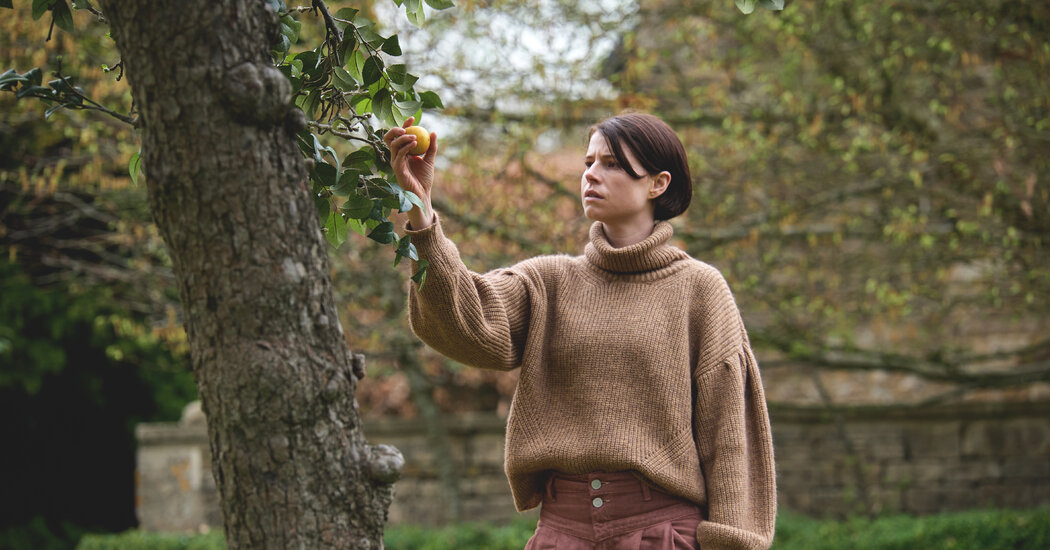
Arriving at the handsome English country cottage she has rented for a few weeks, Harper (Jessie Buckley, last seen in “The Lost Daughter”) spots a tree laden with apples. She plucks, she eats, and the word METAPHOR appears in giant red letters on the screen.
Well, not literally, but the sound design and the camera movements conspire to underline the significance of this moment, and a bit later the owner of the house will pretend to be scandalized by what he calls Harper’s “scrumping.”
The unsubtle evocation of Eve in the garden of Eden is one of many signposts in “Men,” the latest film written and directed by Alex Garland, that point in a single direction. The movie, an uneasy amalgam of horror and allegory, full of creepy, gory effects and literary and mythological allusions, amounts to a sustained and specific indictment of the titular gender.
Whether a woman is eating an apple, going for a walk, bathing or singing or trying to leave a marriage, men will just not leave her alone. Worse, they — we, I guess — have a long history of blaming women for our own crimes and failures, a tradition of misogynist scapegoating that Garland annotates with references to Leda and the swan, Ulysses and the sirens and other canonical touchstones.
Not that there is anything academic about Harper’s ordeal. A resident of London, she arrives in the Cotswolds fresh from a horrific experience that will be expanded in periodic flashbacks. The gist is clear enough right away: After an argument during which he bloodied her nose, Harper’s husband, James (Paapa Essiedu), died, apparently by suicide.
A more conventional version of her story might tease the possibility that what follows is in Harper’s head, that the various guys who torment, terrify and annoy her in the countryside are manifestations of unprocessed grief, guilt and rage. But “Men,” for all its attention to her state of mind — and in spite of Buckley’s exquisitely sensitive performance — isn’t really a psychological thriller. It’s committed to the literal reality and symbolic meaning of events that occur in an uncanny zone between the ordinary and the supernatural.
The fellow from whom Harper rents the house — she describes him as “a very particular type” and “very country” — is a toothy, upper-crusty twit played by Rory Kinnear. Everyone else in and around the nearby village is also played by Kinnear, including a young boy, a pompous vicar, a policeman, a publican and the naked man who appears outside the living room window.
Harper is alarmed by this intrusion, but seems not to notice that all the men she encounters share the same face. There are two other women in the movie, Harper’s friend Riley (Gayle Rankin), who sometimes shows up in a video chat, and a police officer (Sarah Twomey) who is sympathetic but not especially helpful.
As things get scarier out in the country, Harper’s memories of her last morning with James grow more intense, and the imagery shifts from haunting to gruesome. The climax is a bloody tour de force that is less terrifying than puzzling, in part because it also seems, like the business with the apple tree, aggressively obvious.
And also a bit of a muddle. In the other movies he has directed (“Ex Machina” and “Annihilation”), Garland has shown himself to be adept at intellectual genre play, embedding heady ideas about power, desire, technology and violence in tales that lean toward science fiction and horror. In “Men,” he skillfully manipulates moods and subverts expectations without achieving the unsettling, hallucinatory clarity of his best films.
It also lacks the intellectual coherence of other recent exercises in allegorical cinematic provocation — movies like Charlie Kaufman’s “Anomalisa,” Lars von Trier’s “Antichrist,” Yorgos Lanthimos’s “The Lobster” and Jordan Peele’s “Get Out.” There isn’t really an argument here, and what looks like feminism is more like mansplaining.
Men
Rated R. Men! Running time: 1 hour 40 minutes. In theaters.



